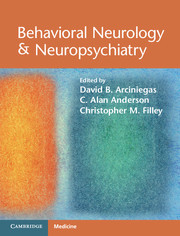Book contents
- Behavioral Neurology & Neuropsychiatry
- Behavioral Neurology & Neuropsychiatry
- Copyright page
- Contents
- Contributors
- Foreword
- Preface
- 1 Introduction
- Section I Structural and Functional Neuroanatomy
- Section II Neurobehavioral and Neuropsychiatric Assessment
- Section III Treatments in Behavioral Neurology & Neuropsychiatry
- 32 Principlesof pharmacotherapy
- 33 Rehabilitation and pharmacotherapy ofcognitive impairments
- 34 Pharmacotherapyof emotional disturbances
- 35 Pharmacotherapyof behavioral disturbances
- 36 Psychotherapy
- 37 Environmentaland behavioral interventions
- 38 Proceduralinterventions
- Index
33 - Rehabilitation and pharmacotherapy ofcognitive impairments
from Section III - Treatments in Behavioral Neurology & Neuropsychiatry
Published online by Cambridge University Press: 05 February 2013
- Behavioral Neurology & Neuropsychiatry
- Behavioral Neurology & Neuropsychiatry
- Copyright page
- Contents
- Contributors
- Foreword
- Preface
- 1 Introduction
- Section I Structural and Functional Neuroanatomy
- Section II Neurobehavioral and Neuropsychiatric Assessment
- Section III Treatments in Behavioral Neurology & Neuropsychiatry
- 32 Principlesof pharmacotherapy
- 33 Rehabilitation and pharmacotherapy ofcognitive impairments
- 34 Pharmacotherapyof emotional disturbances
- 35 Pharmacotherapyof behavioral disturbances
- 36 Psychotherapy
- 37 Environmentaland behavioral interventions
- 38 Proceduralinterventions
- Index
Summary
Keywords
- Type
- Chapter
- Information
- Behavioral Neurology & Neuropsychiatry , pp. 511 - 542Publisher: Cambridge University PressPrint publication year: 2013
- 1
- Cited by



